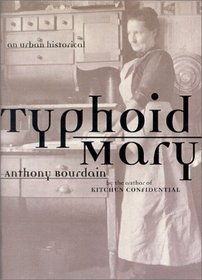Helpful Score: 8
I read it for the first time when I was 17/18. I remember finding it thrilling. The second time around? Not so much. I found myself wanting to skip over large portions of the book. So, I'd recommend only if you have a burning fascination with either the author or Mary Mallon (Typhoid Mary). Also, I wouldn't read the first few chapters while eating, or planning to go to a restaurant. Typhoid transmission through dirty fingers... yum.
Helpful Score: 4
This story is told by a cook about a cook. Bourdain takes the reader on an inside look on what happened in early turn-of-the-century kitchens (and sometimes still does happen, YIKES). He tries to show the reader what this experience would have been like from Mary's point of view as a proud cook suddenly told that she can no longer do what she was born to do. This is not a pure history book if that's what you are looking for; rather it provides a snapshot of the type of world Mary Mallon (Typhoid Mary) lived in and provides reasons from a cook's point of view about why Mary continued to seek employment in the food industry even after it was proven that she was a carrier. It reads more like a conversation or a psychological profile than a history text, which makes it a quick and light read, but I wish I learned more about Mary's actual life than just speculations on why she may have done the things she did.
Helpful Score: 3
In reading this book, I could really hear Anthony Bourdain telling it like it was in that blunt attitude he has. I would've liked to hear more about what happened to her on the island and it would've also been nice to have some pictures of her/where she lived on the island and things of that nature-he talks about several photos he saw though in the book. Very interesting reading nonetheless and i'll definately read more by Anthony Bourdain now that I know he writes books. (I know him from the Travel Channel!)
Helpful Score: 2
An interesting read. I could hear Anthony Bourdain's voice telling me the story in my head.
I didn't know whether to feel sorry for her or not throughout the book.
I didn't know whether to feel sorry for her or not throughout the book.
Helpful Score: 2
This was a short tale of the impact of Typhoid Mary, or Mary Mallon. It's told with some sympathy towards Mary Mallon, as she wasn't ill while cooking and medical science being what it was, would have found it hard to believe that she could carry an illness with her. What's interesting is her stubborness and determination to not cooperate, not change her standards of cleanliness, and her desire to continue cooking knowing that she was spreading disease to families. Was it pride or simply a matter of ignorance and survival? Bourdain tends to believe it was a love of cooking that propelled her, and his view is shared throughout this book. Decent read with interesting historical facts.




